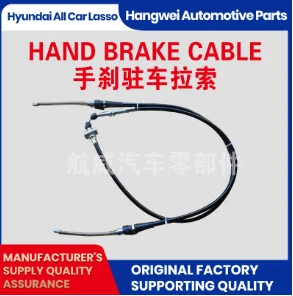clutch fluid pipe
Understanding Clutch Fluid Pipes A Crucial Component in Vehicle Performance
When it comes to vehicle performance and reliability, every component plays a vital role, including the seemingly unassuming clutch fluid pipe. This essential part of your car's hydraulic system is responsible for transferring hydraulic fluid from the master cylinder to the clutch cylinder, enabling smooth engagement and disengagement of the clutch. In this article, we will delve into the importance of clutch fluid pipes, how they function, common issues that may arise, and maintenance tips to ensure optimal performance.
What is a Clutch Fluid Pipe?
The clutch fluid pipe, often referred to as the hydraulic line or hose, is a conduit that carries hydraulic fluid (typically brake fluid) under pressure. This fluid is responsible for actuating the clutch mechanism, which, in turn, allows the driver to shift gears smoothly. The clutch system in modern vehicles relies on hydraulics rather than traditional mechanical linkages, providing more precise control and reducing the effort required to operate the clutch.
How Does It Work?
The operation of the clutch fluid pipe is relatively straightforward. When the driver presses the clutch pedal, this action engages the master cylinder, which then generates hydraulic pressure in the fluid. This pressure is transmitted through the clutch fluid pipe to the slave cylinder, which activates the clutch release bearing, disengaging the clutch from the engine. This process allows the driver to shift gears efficiently. Upon releasing the clutch pedal, the fluid pressure decreases, and the spring mechanism in the clutch assembly re-engages the clutch disc with the flywheel, allowing power to transfer from the engine to the transmission.
Importance of Clutch Fluid Pipes
Clutch fluid pipes are critical for the effective functioning of the clutch system. A properly functioning fluid pipe ensures that hydraulic pressure is maintained, allowing for seamless gear changes. If the fluid pipe becomes damaged or develops leaks, it can lead to a range of problems, including
1. Difficulty in Engaging/Disengaging the Clutch A faulty fluid pipe can cause poor pressure transmission, making it hard for the driver to shift gears. 2. Clutch Slippage Insufficient hydraulic pressure may prevent the clutch from fully engaging, resulting in slippage and the potential for further damage to the transmission. 3. Fluid Leaks A cracked or worn pipe can leak hydraulic fluid, leading to a low fluid level that compromises the entire hydraulic system's integrity.
clutch fluid pipe

Common Issues with Clutch Fluid Pipes
Over time, clutch fluid pipes can wear out due to various factors, including exposure to heat, vibration, and environmental elements such as moisture and road salt. Here are some common issues to be aware of
- Corrosion Metal pipes are prone to rusting, especially if the protective coating wears off. Corrosion can weaken the pipe, leading to leaks. - Cracking or Swelling Rubber hoses can degrade with age or exposure to heat, causing them to crack or swell, which compromises their strength and ability to retain pressure. - Loose Fittings Over time, the fittings connecting pipes and hoses can loosen, resulting in leaks or disconnections.
Maintenance Tips
To ensure the longevity and efficiency of your clutch fluid pipe, consider the following maintenance tips
1. Regular Inspection Periodically check the clutch fluid pipe for signs of wear, corrosion, or leakage. Early detection can prevent major issues down the road. 2. Fluid Replacement Keep an eye on the hydraulic fluid level and quality. Contaminated fluid should be replaced to avoid damaging the clutch system. 3. Professional Servicing If you notice any irregularities in clutch operation or experience fluid leaks, have a professional mechanic inspect the clutch system, including the fluid pipe.
Conclusion
The clutch fluid pipe may not be the most glamorous component of your vehicle, but it is undeniably crucial for the proper functioning of the clutch system. Understanding its role, potential issues, and maintenance needs can help you keep your vehicle operating smoothly and efficiently. Regular inspections and prompt repairs will not only enhance your driving experience but can also prevent costly repairs in the future, ensuring that your car remains reliable for years to come. By paying attention to this essential component, you can maintain optimal vehicle performance and enjoy a smoother ride.
-
Workings of Clutch Pipe and Hose SystemsNewsJun.04,2025
-
The Inner Workings of Hand Brake Cable SystemsNewsJun.04,2025
-
The Secrets of Throttle and Accelerator CablesNewsJun.04,2025
-
The Hidden Lifeline of Your Transmission Gear Shift CablesNewsJun.04,2025
-
Demystifying Gear Cables and Shift LinkagesNewsJun.04,2025
-
Decoding Clutch Line Systems A Comprehensive GuideNewsJun.04,2025
